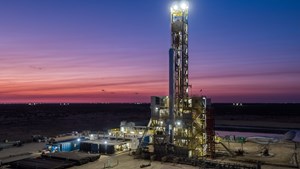Enverus: Oil and gas companies using “historic” M&A wave to replace declining shale reserves
(WO) — Enverus Intelligence Research (EIR), a subsidiary of Enverus, is releasing its summary of Q4 and full-year 2023 upstream merger and acquisition (M&A) activity. Q4 recorded a massive $144 billion in upstream M&A, the largest quarter EIR has tracked. That pushed full-year 2023 value to more than $190 billion, also setting a record. Driving the surge in value were two historic deals: ExxonMobil’s $65 billion acquisition of Pioneer Natural Resources in the third-largest upstream deal ever by enterprise value and Chevron purchasing Hess for $60 billion in the fourth largest ever.
“Oil and gas is undergoing a historic consolidation wave comparable to what occurred in the late 1990s and early 2000s, giving rise to the modern supermajors,” said Andrew Dittmar, senior vice president at Enverus. “After a decade of lowered investment in exploration and with the major U.S. shale plays largely defined, M&A has become the preferred tool to replace declining reserves and secure longevity in these companies’ profitable upstream businesses. For the best quality resource, there are also now more buyers than sellers, driving prices upward.”
Among unconventional oil resource plays in the U.S., the Permian stands well atop the heap for remaining resource, offering both the most high-quality remaining drilling opportunities and the greatest potential for resource expansion from the prolific region’s stacked resource benches. It is unsurprising then that the Permian dominated M&A activity in 2023 with $103 billion transacted. That included a buy-in from Exxon as it made the Permian a cornerstone of its global portfolio with the $65 billion Pioneer purchase. Occidental also increased its commitment to the Permian with the purchase of private CrownRock for $12 billion in December 2023.
“The Permian was a juggernaut for deals in 2023, both for private sales and corporate M&A,” said Dittmar. “Buyers increasingly showed a willingness to pay whatever it took to boost their footprint in this critical play, and prices for future drilling inventory climbed to new highs. While the buyer interest is still there, we are unlikely to see an encore in 2024 because the available list of attractive takeout targets has grown short. At the top of that reduced target list is privately held Endeavor Energy Resources, which has an excellent chance of generating the largest transaction of 2024.”
With the Permian increasingly consolidated, and few other U.S. plays offering the breadth of undeveloped inventory, buyers may increasingly look outside the United States for acquisition opportunities. Chevron struck an early move in that direction by acquiring Hess, largely for its exposure to Guyana. However, in an increasingly deglobalized world, attractive international acquisition opportunities are also more challenging. Canada stands out for U.S. companies as offering a large resource base in a developed and stable country. The Montney, which offers almost twenty years of high-quality drilling inventory at current development rates, will likely get some close looks from U.S. companies concerned about the scale and quality of inventory left to buy at home.
While 2023 was the year of the Permian mega-deal with average deals size growing to almost $4 billion, looking just at announced deals of at least $100 million, 2024 may return to a higher flow of smaller, asset sized transactions across a wider distribution of plays. “Bigtime corporate M&A naturally leads to portfolio pruning, with Occidental as one example by announcing it was planning to shed $4.5-6 billion of assets, mostly from its domestic portfolio,” said Dittmar. “That should be a welcome development for some of the smaller public E&Ps plus private capital that has been priced out or lacked the scale to compete in the strategic core Permian deals. Among the plays likely to see an uptick in 2024 deals are the SCOOP | STACK in Oklahoma, Eagle Ford in Texas and North Dakota’s Bakken. These plays had just a combined $11 billion of deals in 2023.”
Private capital is still being raised and deployed, albeit at a slower pace than previous cycles, and would likely be interested in these non-core assets if the price was right. There have been about 20 new commitments announced by private equity firms in the last two years, excluding groups investing in minerals and royalties. However, the game has changed for these firms. Rather than buying promising exploratory acreage and hoping to prove it up before selling to a public operator, the firms will likely be looking to buy relatively developed assets cheaply and generate dividends for their private investors.
In 2023, upstream M&A was overwhelmingly focused on oil, with $186 billion in deals targeting crude compared to just $6 billion in gas-centric acquisitions. The largest gas deal wasn’t announced until nearly the end of the year when Tokyo Gas purchased Rockcliff Energy in the Haynesville for $2.7 billion in December 2023. Last year’s gas M&A total has already been topped in 2024 with Chesapeake Energy merging with gas peer Southwestern Energy for nearly $12 billion including Southwestern’s debt. There is likely to be increasing interest in gas assets as the long-awaited U.S. LNG ramp nears with the U.S. slated to add 10 Bcf/d of LNG export capacity over the next 36 months. That should eventually offer relief for producers from low natural gas prices, although they will likely need to be patient. With gas storage filling and production still strong, gas prices through most of 2024 are likely to be as low or lower than the challenged 2023 market.



